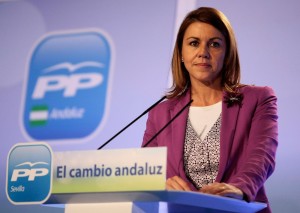
Mariano Rajoy’s Partido Popular (PP) may have won the most seats of any party in Sunday’s regional election in Andalusia, but he will view the result as a resounding failure.
Rajoy’s conservatives finished the vote count with 50 seats, compared with the Socialists’ 47. In the Socialists’ biggest regional stronghold, that might look like a triumph, but with the United Left (IU) taking 12 seats, the left did enough to govern in coalition.
This election came three months into the tenure of Rajoy as prime minister and was seen as a gauge of his national government, as much as the performance of his Andalusian candidate, Javier Arenas.
Andalusia has enormous symbolic significance. Ever since the creation of Spain’s current autonomous regional system three decades ago, it has been governed by the Socialists. With over 8 million inhabitants it is the country’s most populated region, and after Catalonia has the second-largest budget. Perhaps more relevantly, it has a jobless rate of 31 percent.
Having dominated last May’s local elections and then securing a landslide in November’s general election, the scene was set for the PP to take the last bastion of the Socialist Party, thus controlling 12 of Spain’s 17 regions.
The fact that the Socialists defied the polls and managed to cling on to power in the southern region is important for them and the PP. For the PP, it suggests that austerity measures introduced by the Rajoy administration on a national level dented the party’s support. Also, the strategy of delaying the unveiling of the 2012 budget and a new package of deficit-cutting measures until the end of this week, in order to avoid spooking Andalusian voters, failed.
For the Socialists, coming second in their biggest electoral stronghold can hardly be called a huge victory. But given the run-up to the vote, it could almost be seen as just that. Thirty years in power in the region, the erosion of the Socialists’ image on a national level and a high-profile corruption scandal involving early retirement payments had all suggested the party was heading for disaster.
The result offers some respite to new party leader Alfredo Pérez Rubalcaba, who was the candidate in his party’s November electoral disaster.
The Socialists also delivered a surprise in Asturias, the other region where elections were held on Sunday, winning the most seats. However, the right could still govern there if the PP, which came third, can resolve its differences with Francisco Álvarez-Cascos, a renegade former party big-wig whose FAC came second.
With a general strike scheduled for Thursday, unpopular austerity measures to be announced on Friday and markets currently focusing their attention on Spain’s public accounts, it’s going to be a tough week for Rajoy.
Leave a Reply
You must be logged in to post a comment.